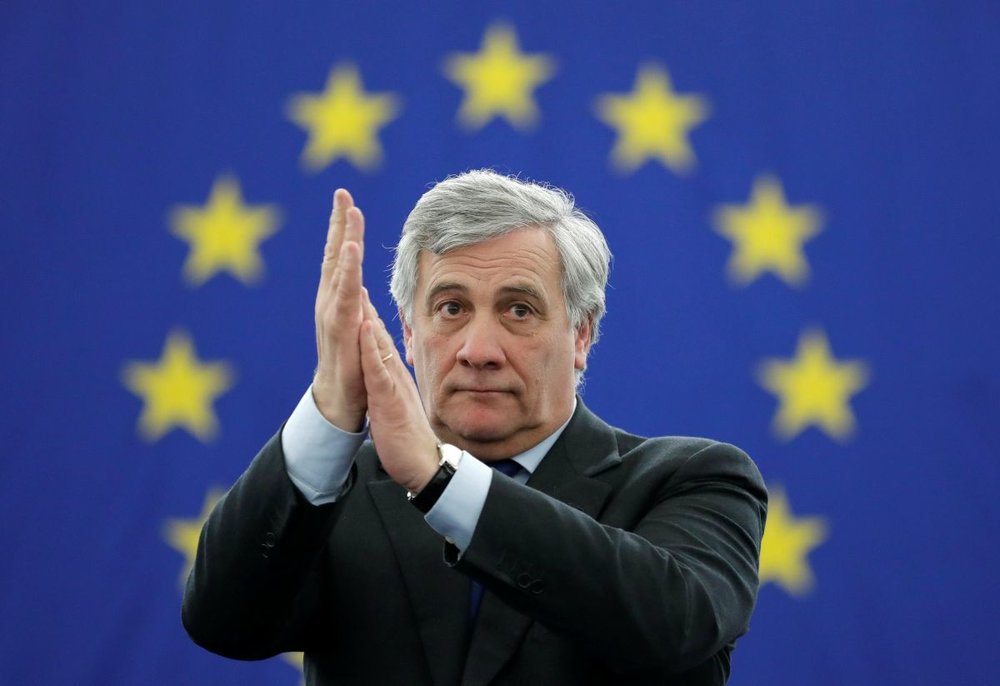An end to cosy consensus in the European Parliament

Antonio Tajani’s election as president brings some welcome debate.
If the EU is an institution sliding towards crisis, its parliament has done little to arrest the fall. The bloc is not just reeling from the forthcoming departure of the UK but from an apparent failure of confidence in the union among several member states. Avowedly Eurosceptic parties are on the rise and yet the European Parliament has, until now, displayed little awareness that it needs to become more representative and responsive.
Last week there was a sign of change: Antonio Tajani was elected the parliament’s new president. Tajani, an Italian former European commissioner, is a controversial figure. His election represents a shift from rule by consensus to adversarial politics, which may bring credibility to a body stifled by convention. The European Parliament is the weakest of the central institutions. It is not a full legislative body with the right to propose laws. Yet it still has an important role to play, having gained increasing power with successive institutional treaties. It now has a veto on most legislation — including, importantly, trade deals. If the UK signs a trade pact with the EU after Brexit, the parliament will need to assent. It is also supposed to play a key role in representing European public opinion and in holding the European Commission, the EU’s executive branch, to account. It has not done well on either account. European voters have shown considerable suspicion about federalizing power, but the parliament has given Eurosceptic views insufficient voice.
The stitch-up that brought Martin Schulz, Tajani’s predecessor, to the parliament presidency was a model of cosy insider politics. Schulz was kept in the job as a consolation prize after his centre-left grouping came second in the 2014 parliamentary elections. The candidate of the victorious center-right European People’s party, Jean-Claude Juncker, was appointed commission president.
Grand coalition
Since then the parliament has been run by a “grand coalition” of the center-left and center-right groupings, which have divided up the top jobs between them, isolated the Eurosceptic minority and failed to subject the commission to sufficient scrutiny. Europhobes wanting to portray the parliament as a prime example of a self-reinforcing EU clique received plenty of material. Tajani’s election has to some extent broken that mold. It involved a deal between the liberal centrist group, the EPP, and the more rightwing and Eurosceptic European Conservatives and Reformists (ECR), which contains the UK Conservatives and the harder-right Polish Law and Justice party. The inclusion of the ECR in the alliance may raise eyebrows; so may Tajani himself. The president starts his term with the so-called “dieselgate” scandal hanging over him. He was the European commissioner responsible for setting regulations for car exhaust pollution while Volkswagen was breaking the law in the U.S. by evading official tests for emissions of nitrogen oxide.
So be it. Electing a president in a divided parliament will always involve some horse-trading, and may produce unexpected leaders. At least with Tajani’s elevation the dealmaking has produced an outcome conducive to debate rather than cynical conformity. It remains to be seen whether the new ruling coalition can do a better job of scrutinizing the commission and representing Europe’s voters. In itself, it is a broad alliance including many centrist federalist members. Yet the shift from a grand coalition to a leadership with a distinctive identity brings hope that an often overlooked part of the EU machinery can play a more constructive part.
(Source: FT)
Leave a Comment